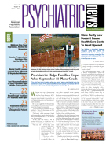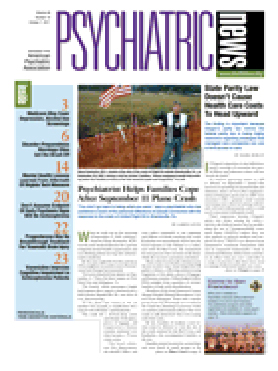The fall meeting of the Board of Trustees was held last month in Arlington, Va., and I'd like to summarize a few highlights. The meeting was scheduled to coincide with the September Component Meetings, providing a nice opportunity for the Board, council, and committee members to interact. Reports were presented by Jay Scully (CEO report), David Fassler (treasurer's report), Dilip Jeste (Joint Reference Committee report), Ann Sullivan (speaker's report), and Jay Scully and Paul Burke (American Psychiatric Foundation report). Copies of these reports are posted on the APA Web site under "Members Corner," and I highly recommend taking the time to read them.
Jay Scully led an extensive discussion on the federal budget situation. Jay reported hot-off-the-press information about the congressional "supercommittee" charged with reducing the budget by at least $1.2 trillion within the next 10 years. Not only is this a daunting challenge, but a plan needs to be developed within the next eight to 10 weeks and completed, at the latest, by December 23. It is no surprise that health care will be dead center in these discussions. Medicare physician fees are on the chopping block, but they may be capped at a 2 percent reduction; if that cap holds, which would be an important protection for Medicare, it would constrict the options and increase the likelihood of cuts elsewhere, such as at NIH. No matter what happens, it seems almost certain that drastic reductions may be proposed for graduate medical education, both direct (support to teaching hospitals for trainees) and indirect (support for teaching faculty). These are grave concerns, but it is reassuring that Jay and his expert staff (Gene Cassel, Nick Meyers, Sam Muszynski) are key players taking part at the table in these discussions to represent psychiatry.
In addition, the problem formula referred to as the sustainable growth rate (SGR) adds to the challenge. The current "patch" to prevent significant cuts in Medicare reimbursement to physicians ends on December 31. APA has been working hard, along with the AMA and other physician organizations, to keep this issue prioritized, since the estimated cost to permanently fix the problem is more than $300 billion—an amount not included in the budget calculations. If Congress doesn't take action, physician reimbursement in Medicare will be cut by about 30 percent on January 1, 2012, which would be disastrous—a "perfect storm" of doctors bailing from the Medicare provider rolls at a time when the population aged 65 and older is growing exponentially. Finally, regarding mental health care financing, it is important for us to remember that the 5 percent "bump" increase in reimbursement for psychiatric CPT codes was time limited and ends on December 31. This reversion to former reimbursement levels could perhaps be partially offset by utilizing the evaluation and management (E&M) code category, when appropriate.
Ann Sullivan, speaker of the Assembly, presented a summary of a great deal of work under way, and she gave a preview of the plans for the Assembly meeting in mid-November. There will be special reports from Assembly work groups on DSM-5 (Glen Martin, chair), Legislative-Public Affairs (Mindy Young, chair), Communications (Scott Benson, chair), Access to Care (Joe Mawhinney, chair), and Membership Engagement/Mentorship/Leadership (Harry Brandt, chair). A lot going on!
In addition to other regular reports, the Board heard reports from several task forces and work groups:
DSM-5: David Kupfer and Darrel Regier gave a status report on the work of the DSM-5 Task Force. They reported that the work continues to be on schedule, with the expected publication date of May 2013. They reported that the work of Susan Schultz, DSM-5 text editor, is well under way to develop a SharePoint Web site as a headquarters for drafts of text sections and that a text coordinator has been identified from each work group.
Field trials are making good progress at the 11 large academic sites, with 1,640 baseline visits and 1,458 second visits completed by participating patients by mid-August. The Routine Clinical Practice component of the field trials is ramping up, which, in spite of a few startup hiccups, is enrolling and training participants, with a goal to enroll about 9,600 volunteer clinicians. The proposed "metastructure" for DSM-5 is posted on the Web site and was open for comments along with new revisions in many work group categories, from May 4 through July 15. Remarkably, there were almost 220,000 unique site visitors, including visitors from 187 countries.
After the summary report from David and Darrel, an update was provided by Ken Kendler, chair of the DSM-5 Scientific Review Committee (SRC). Using a template and a designated set of validators, the SRC is reviewing the proposed changes for DSM-5 and providing input to the task force and the Board, which is greatly appreciated.
Maintenance of Certification (MOC): Mary Helen Davis, chair of this work group, gave a summary report, focusing on new developments from an Implementation Group of the Federation of State Medical Boards on the growing interest in Maintenance of Licensure (MOL). APA will be monitoring these developments closely and providing our members with regular updates.
Other reports: Dilip Jeste gave an interim report from the Work Group on Intenational Activities, and Ann Sullivan reported from the Work Group on Membership. Among many ideas, the Board discussed interesting suggestions to enhance opportunities for international psychiatrists to join APA and suggestions to improve communication with our members about the many ongoing efforts by APA on their behalf. All readers of this column are invited to let us know your ideas in this regard!
One of the last agenda items at the meeting was the report of the reorganized American Psychiatric Foundation (APF), the new (c)(3) APA subsidiary that combines the previous version of the foundation with American Psychiatric Publishing (now "APP" instead of "APPI") and the American Psychiatric Institute for Research and Education (APIRE). Jay Scully, chair of the new Board of APF, and Paul Burke, who was congratulated enthusiastically for being chosen as executive director of the new APF, summarized the progress of a number of outstanding activities the APF supports. There are way too many activities than I have room to write about here, but (I repeat) check out the Web site at <
www.psychfoundation.org/>! Here are a few samples:
Typical or Troubled? This is a terrific grant-supported school mental health education program, with training planned or under way in 15 schools.
Judges' Leadership Initiative: This growing program is designed to provide training and expertise to judges across the country relating to mental health courts, jail diversion programs, and other innovations.
Minority Fellowship Programs: Under the auspices of APIRE, this network of fellows and mentors continues to be highly successful, focusing on research training, cultural competence, and a wide range of original and creative pursuits.
Overall, the back-to-back September Component Meetings and Board of Trustees meeting were busy and productive, reflecting the terrific work being done by APA members from all over the country. My thanks to all!


